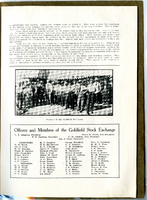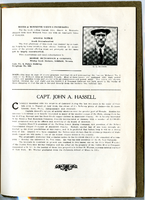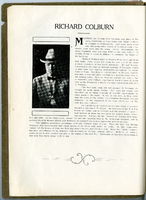Search the Special Collections and Archives Portal
Search Results
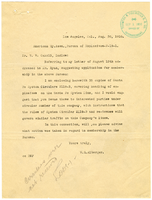
Letter from W. R. Alberger to W. W. Cahill, August 30, 1910
Date
1910-08-30
Archival Collection
Description
Letter is in regard to receipt of Santa Fe System Circulars 2119-B for persons interested in membership in the Bureau for Safe Transportation of Explosives.
Text
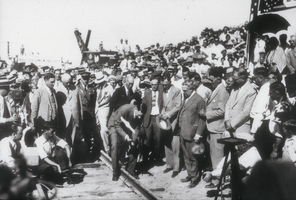
Slide of Ray Wilbur driving a railroad spike and signaling the beginning on construction on the Hoover Dam, Nevada, September 19, 1930
Date
1930-09-19
Archival Collection
Description
A black and white image of Secretary of the Interior, Ray Lyman Wilbur driving the last spike into the railroad from Las Vegas to the site of the Hoover Dam, signaling the beginning of construction. Also in the photograph are the following: Congressman William Eaton, of Colorado; Senator Key Pittman, Nevada; and Senator Samuel Shortridge. The celebration took place either at Boulder Junction (south of Las Vegas) or in Boulder City.
Image
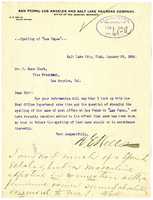
Letter from Ralph E. Wells to J.Ross Clark, January 23, 1904
Date
1904-01-23
Archival Collection
Description
Letter deals with confusion over the proper spelling of Las Vegas.
Text
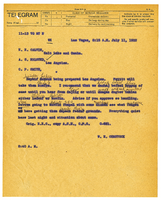
Telegram from W. H. Comstock to E. E. Calvin, A. S. Halsted and C. P. Smith, July 11, 1922
Date
1922-07-11
Archival Collection
Description
Coded portions of the telegram have handwritten transcriptions above them.
Text
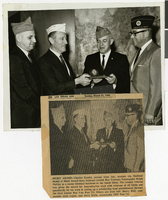
Photograph of Charles Kandel accepting the National Medal of Merit Award, Las Vegas (Nev.), March 21, 1965
Date
1965-03-21
Archival Collection
Description
Newspaper clipping description reads: "LAS VEGAS SUN. Sunday, March 21, 1965. MERIT AWARD - Charles Kandel, second from left, accepts the National Medal of Merit Award from National Jewish War Veterans Commander Ralph Plofsky at a recent informal luncheon at the Sands Hotel. The combat veteran was given the award for humanitarian work with veterans of all faiths and specifically for his work in setting up a scholarship fund administered through the local Jewish War Vets Post 711. Others are from left: Henry Wolf, commander six region, and Jerry Klein, commander JWV Post 711."
Image
Pagination
Refine my results
Content Type
Creator or Contributor
Subject
Archival Collection
Digital Project
Resource Type
Year
Material Type
Place
Language
Records Classification

